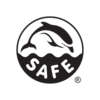
Dolphin Safe / Dolphin Friendly
Dolphin Safe or Dolphin Friendly is a label or certification that indicates a product, such as canned tuna, was caught using methods that do not harm or endanger dolphins. The label is designed to assure consumers that the fishing practices used to catch the product are environmentally responsible and do not contribute to dolphin bycatch or mortality.
The Dolphin Safe certification was developed in response to concerns over the high incidental capture of dolphins in certain fishing practices, such as purse seine nets. These nets can inadvertently trap dolphins while targeting other species, such as tuna, that swim together with dolphins. By setting standards and requirements for fishing operations, the Dolphin Safe label aims to promote sustainable fishing practices and reduce the negative impact on dolphin populations.
To earn the Dolphin Safe certification, fishing operations must comply with specific criteria, which may include:
No intentional chasing, encirclement, or netting of dolphins during fishing operations.
The use of specific fishing techniques, such as dolphin-safe purse seine nets or pole and line fishing, that minimize the risk of dolphin bycatch.
Implementation of monitoring and verification measures to ensure compliance with the standards.
Certification programs, such as the Dolphin Safe/Tuna Tracking and Verification Program administered by the Earth Island Institute, work with fishing companies and suppliers to verify compliance with the standards. They conduct regular audits and inspections to ensure ongoing adherence to the certification requirements.
The Dolphin Safe label has gained recognition and trust among consumers who seek to support environmentally responsible fishing practices. By choosing products with the Dolphin Safe or Dolphin Friendly label, consumers can make a conscious choice to support sustainable fishing methods and the conservation of marine wildlife.
It's important to note that the Dolphin Safe label specifically focuses on the protection of dolphins in fishing operations, and it does not address other environmental or sustainability issues associated with seafood production, such as overfishing or habitat destruction. Consumers interested in broader sustainability considerations may look for additional certifications or labels, such as those related to sustainable seafood or eco-labels.